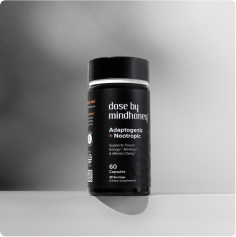Neurochemicals: Why Are They So Important?

Neurochemicals: Why Are They So Important?
Neurochemicals are substances produced and used by the cells of the nervous system to communicate with each other and with other cells in the body.
They play a vital role in maintaining the proper functioning of the brain and nervous system, and are involved in a wide range of physiological processes including cognition, emotion, behavior, and movement.
There are many different types of Neurochemicals, each with its own unique properties and functions. Some of the most important Neurochemicals include:
- Neurotransmitters: These are chemical messengers that transmit signals between neurons, or between neurons and other cells in the body. Examples of neurotransmitters include serotonin, dopamine, and norepinephrine.
- Neurohormones: These are chemicals produced by neurons that act as hormones, influencing the activity of cells and organs throughout the body. Examples of neurohormones include oxytocin, vasopressin, and melatonin.
- Neuropeptides: These are small proteins produced by neurons that act as neurotransmitters or neuromodulators. Examples of neuropeptides include endorphins, enkephalins, and dynorphins.
Each of these Neurochemicals has a unique set of properties and functions, and they play a vital role in maintaining the proper functioning of the brain and nervous system.
Now let’s breakdown each of these Neurochemicals and their chemical functions:
Neurotransmitters:
Neurotransmitters are critical in maintaining the proper functioning of the brain and nervous system, and are involved in a wide range of physiological processes including cognition, emotion, behavior, and movement.
Some of the most important neurotransmitters include:
- Serotonin: Neurotransmitter that plays a key role in mood regulation and is involved in the regulation of sleep, appetite, and digestion. Low levels of serotonin have been linked to depression, anxiety, and other mood disorders.
- Dopamine: Neurotransmitter that is involved in the reward and pleasure pathways of the brain, and is also involved in movement and cognition. Low levels of dopamine have been linked to Parkinson's disease and other neurological disorders.
- Norepinephrine: Neurotransmitter that supports the regulation of mood, arousal, and attention. It is also involved in the fight or flight response, and is released during times of stress or danger.
- Acetylcholine: Neurotransmitter that plays a key role in the regulation of muscle movement and is also involved in learning and memory. Low levels of acetylcholine have been linked to conditions such as Alzheimer's disease.
- GABA: Neurotransmitter that acts as an inhibitory neurotransmitter, meaning it helps to reduce the activity of neurons and keep them from becoming overexcited. It is involved in the regulation of anxiety, sleep, and muscle tone.
- Glutamate: Neurotransmitter that acts as an excitatory neurotransmitter, meaning it helps to increase the activity of neurons. It is involved in learning, memory, and the regulation of mood.
Neurohormones:
Neurohormones play a key role in maintaining the proper functioning of the brain and nervous system, and are involved in a wide range of physiological processes including cognition, emotion, behavior, and movement.
Some of the most important neurohormones include:
- Oxytocin: Neurohormone that is involved in the regulation of social behavior, bonding, and reproduction. It is often referred to as the "love hormone" because it is released during times of bonding and attachment.
- Vasopressin: Neurohormone that is involved in the regulation of water balance in the body and is also involved in social behavior and aggression.
- Melatonin: Neurohormone that is involved in the regulation of sleep-wake cycles and is produced in response to darkness.
- Corticotropin-releasing hormone (CRH): Neurohormone that is involved in the regulation of the stress response and the release of hormones from the adrenal gland. It is also involved in the regulation of sleep and appetite.
- Adrenocorticotropic hormone (ACTH): Neurohormone produced by the hypothalamus that stimulates the production and release of the hormone cortisol from the adrenal gland. It is involved in the regulation of the stress response and the immune system.
- Gonadotropin-releasing hormone (GnRH): Neurohormone produced by the hypothalamus that stimulates the production and release of the hormones luteinizing hormone (LH) and follicle-stimulating hormone (FSH) from the pituitary gland. It is involved in the regulation of the reproductive system.
Neuropeptides:
Neuropeptides play a variety of important roles in the body, including regulation of pain, pleasure, mood, and stress.
Some of the most well-known neuropeptides include:
- Endorphins: Neuropeptides that are involved in the regulation of pain and pleasure. They are often released in response to stress or exercise, and are thought to contribute to the "runner's high" experienced by some people during prolonged endurance exercise.
- Enkephalins: Neuropeptides that are involved in the regulation of pain and stress. They bind to the same receptors as endorphins and have similar effects on the body.
- Dynorphins: Neuropeptides that are involved in the regulation of pain and stress. They are thought to have a role in the development of addiction and withdrawal.
- Oxytocin: Neuropeptide that is involved in the regulation of social behavior, bonding, and reproduction. It is often referred to as the "love hormone" because it is released during times of bonding and attachment.
- Vasopressin: Neuropeptide that is involved in the regulation of water balance in the body and is also involved in social behavior and aggression.
- Neurotensin: Neuropeptide that is involved in the regulation of pain, appetite, and the stress response. It is also thought to have a role in the development of addiction.
Summary:
Neurochemicals are substances produced and used by the cells of the nervous system to communicate with each other and with other cells in the body.
They play a vital role in maintaining the proper functioning of the brain and nervous system, and are involved in a wide range of physiological processes including cognition, emotion, behavior, and movement.
Dysregulation of neurochemical signaling has been linked to a number of psychiatric and neurological disorders, and research is ongoing to better understand the roles of these chemicals in the body and how they can be used to treat and prevent disease.



